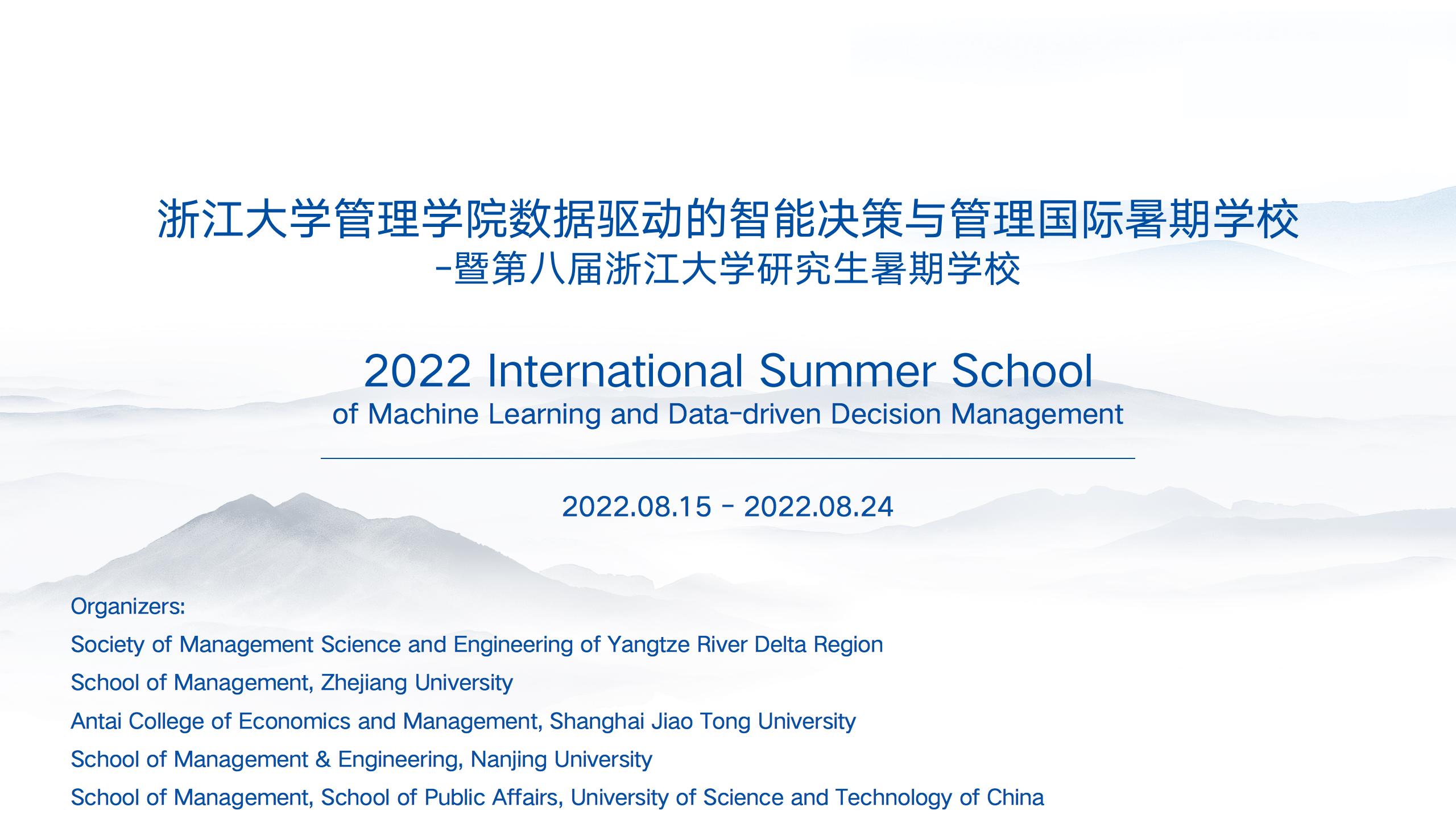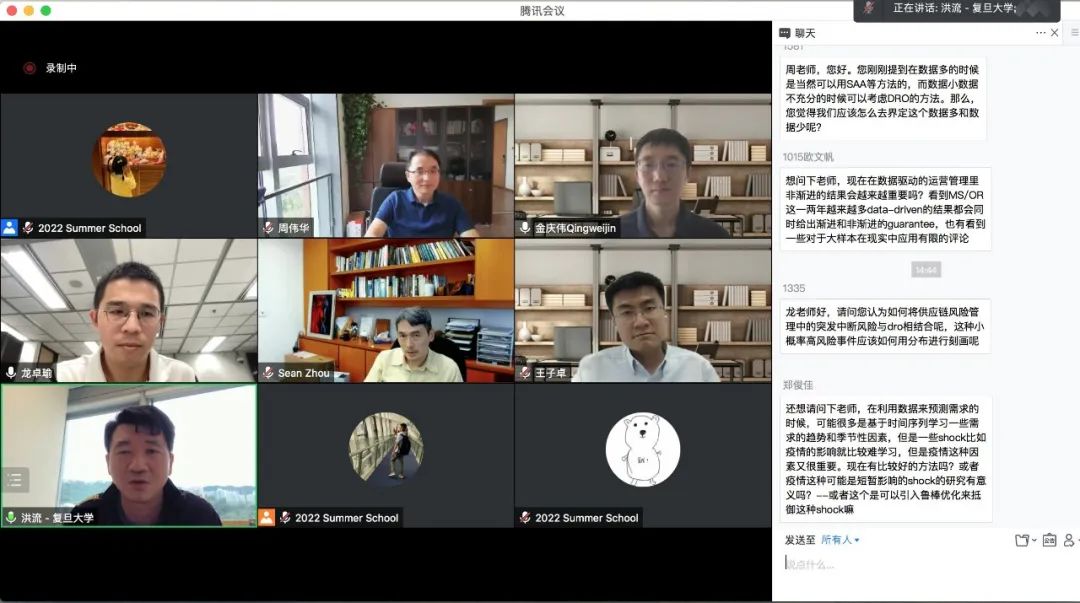On August 24, ZJU International Summer School 2022 of Machine Learning and Data-driven Decision Management—the 8th Zhejiang University Graduate Summer School was successfully concluded online.

This Summer School was jointly held by School of Management at Zhejiang University (ZJU-SOM), International Research Center for Data Analysis and Management of Zhejiang University, the Antai College at Shanghai Jiao Tong University, School of Management & School of Public Affairs at University of Science and Technology of China, School of Management and Engineering at Nanjing University and Society of Management Science and Engineering of Yangtze River Delta Region.
Prof. Zeyu Zheng from University of California, Berkeley, Prof. Zizhuo Wang from The Chinese University of Hong Kong, Shenzhen, Prof. Zhuoyu Long from The Chinese University of Hong Kong, Prof. Dan Zhang from University of Colorado, Prof. Xi Chen from New York University and Prof. Ping Xiao from The University of Melbourne are invitd as speakers to give presentations and share ideas regarding their academic research fields. Over 2000 participants joined in this academic feast and they were greatly benefited in this program.
On the morning of August 15, ZJU International Summer School 2022 of Machine Learning and Data-driven Decision Management officially opened. The opening ceremony was hosted by Prof. Qingwei Jin from ZJU-SOM. Prof. Weihua Zhou, Director of International Research Center for Data Analysis and Management of Zhejiang University, delivered his welcome speech. He first expressed his sincere thanks to all the guests and organizers of the Summer School and hoped that this summer school could provide an open platform for communication for researchers to learn cutting-edge data-driven methods.
Prof. Qingwei Jin from Zhejiang University, Prof. Cheng Hua from Shanghai Jiao Tong University, Prof. Caihua Chen from Nanjing University, Prof. Yufeng Cao from Shanghai Jiao Tong University and Distinguished Research Fellow Hemin Jiang from University of Science and Technology of China and Prof. Juan Li from Nanjing University took turns as moderators during the program. Lets have a recap of the speakers’ excellent sharing.

Group photo of guests at the Opening Ceremony
1. Theory and Application of Nonstationary Stochastic Process in Managerial Decisions - Prof. Zeyu Zheng
Prof. Zeyu Zheng from the University of California, Berkeley, gave a wonderful presentation on Non-stationary Stochastic Processes and its Applications in Management Decisions. Prof. Zheng used several examples to introduce the meaning of stochastic process and its significance to the study of future decision-making. At the same time, Prof. Zheng explored why non-stationary stochastic processes were important for certain decision problems through two theoretical studies. Prof. Zheng pointed out that in the case of non-stationary, the selection of data was very important. At the same time, the degree of information mastery also determined the accuracy of prediction and decision-making, and obtaining more information could reduce the uncertainty.
2. Revenue Management Problems under Consumer Choice Models - Prof. Zizhuo Wang
Prof. Zizhuo Wang from The Chinese University of Hong Kong, Shenzhen, introduced the basic concepts and ideas of Revenue Management Problems under Consumer Choice Models. Then, the lecturer offered some classical models and analyzed the details of these models. In addition, some operational decision-making problems based on the topic were introduced and discussed. Moreover, Prof. Zizhuo Wang gave several recent research directions, ranging from incorporating multistage behavior to network effects into consumer choice models. At the end of the lecture, Prof. Zizhuo Wang summarized the content of the whole lecture and answered the questions raised by the participants.
3. Theory and Application of Revenue Management - Prof. Dan Zhang
Prof. Dan Zhang, from University of Colorado Boulder, offered a short course which consists of two lectures. In the first lecture, he covered fundamentals of revenue management and pricing and several emerging research streams. The lecture featured case studies and a selective discussion on the recent literature as well as some new development on revenue management. Lecture II discussed strategic pricing with repeated interactions between a firm and its customers. At the same time, he shared his research about models and analysis of customer reward programs. In the end, Prof. Zhang also shared his research experience with the participants, including how to determine the research topic and how to integrate the research with the practice, which greatly inspired the students in this field.
4. Distributionally Robust Optimization and Its Applications in Data-Driven Operations Management - Prof. Zhuoyu Long
Prof. Zhuoyu Long from the Chinese University of Hong Kong introduced the basic knowledge and latest development of distributionally robust optimization in this short course. Specifically, Prof. Long explained how to model various data-driven distributionally robust optimization problems and introduced some classic reformulation techniques. These models were based on different types of information, such as moments or distances with respect to a reference distribution. In addition, Prof. Long also introduced a wide range of application scenarios of distributionally robust optimization, including healthcare operations, project management, portfolio optimization and supply chain management, and illustrated the effectiveness of distributionally robust optimization methods. In this course, the students learned a lot and actively interacted with the professor.
5. From Machine Learning to Decision Making - Prof. Xi Chen
Prof. Xi Chen from New York University brought us a wonderful report on the theme of "From Machine Learning to Decision-Making". Prof. Chens report mainly introduced the foundations of online learning based on the multi-armed bandit framework and applications to revenue management. He demonstrated the basic concepts of the three algorithms including ε-greedy algorithm, UCB algorithm and Thompson sampling algorithm, and their application to dynamic pricing. In addition, Prof. Chen also introduced the basic knowledge of Bayesian estimation. During the Q&A session, Prof. Chen briefly introduced the latest development of multi-armed bandits, and recommended reference papers and related books to everyone. In his second lecture, Prof. Chen took "Dynamic Classification Planning under MNL Model" as the theme and introduced the common sweater box sales in daily life as an example. He introduced the modeling process of MNL model and the framework and policy design of dynamic assortment optimization, and expounded several hot research directions in this field. In addition, Prof. Chen also introduced the robust statistical model, and actively asked questions and discussed with the teachers and students. At the end of the lecture, he shared some relevant papers with the students, reminded the students to pay attention to the application of the data in the papers, and encouraged them to read more, think more and study more.
6. Insights from Data Analytics: Reduced form Research Approach & Structural Model Research Approach - Prof. Ping Xiao
Prof. Ping Xiao from the University of Melbourne brought us a wonderful report with the theme of "Insights in Data Analysis: Reduced form Research Approach". By explaining her working paper, Prof. Xiao showed us how to analyze economic and business phenomena from data by the reduced form research approach. First, Prof. Xiao explained the essential difference between data analysis and research, and introduced the research problem extracted from the Three-part tariff pricing. Then, Prof. Xiao demonstrated and compared the application of traditional method and the reduced form research approach on this problem. In the second part of the lecture, Prof. Ping Xiao introduced the meaning of structural model method in detail, and pointed out the difference between structural model method, reduced form research approach and structural equation model, focusing on the theme of "Insights from Data analysis: structural model research methods". This approach helped researchers to build a model based on economic or behavioral theory to state the behavior of agents and infer economic/business phenomena from data. Through her own research publications and the example of home appliances going to the countryside, she vividly explained the structural model method to the students. At the end of the lecture, she answered the questions patiently asked by the audience.
7. Panel Discussion:Frontiers in Data-driven Management Researches - Prof. Zizhuo Wang, Prof. Zhuoyu Long, Prof. Liu Hong, Prof. Sean Xiang Zhou, Prof. Weihua Zhou and Prof. Qingwei Jin
On the afternoon of August 24, six professors and all participants held an exciting panel discussion about frontiers in data-driven management research. For beginning, the professors outlined their own views of data-driven management. Prof. Liu Hong proposed the big gap between the development speed of computing power and other fields; Prof. Sean Xiang Zhou introduced the application frontier of data-driven in inventory management. The mainstream methods include SAA and SGD; Prof. Zizhuo Wang pointed out that data-driven is a model-computing integrating process in OR... Subsequently, the professors gave detailed answers to the questions raised by the students, helping them deepen their understanding of data-driven management research and the future trend of the industry.

ZJU-SOM has always been committed to building a high-quality academic exchange platform, allowing the participants to have an opportunity to have close academic discussions with the scholars and experts in the field. We would like to thank the lecturers for their excellent sharing, which deepened the participants understanding of the frontier areas related to data-driven decision management. ZJU-SOM will also take this opportunity to continuously deepen international cooperation.
Source: International Research Center for Data Analysis and Management of Zhejiang University
Editor: ZHU Yudi